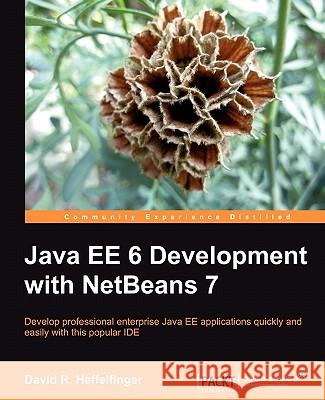Java Ee 6 Development with Netbeans 7 » książka
Java Ee 6 Development with Netbeans 7
ISBN-13: 9781849512701 / Angielski / Miękka / 2011 / 392 str.
NetBeans has several features that greatly simplify Java EE development, but with many features and great flexibility, Java developers can become overwhelmed by the options available in NetBeans. This book provides step-by-step recipes that show you how to take control of the environment and make use of these features to make your enterprise Java application development more efficient and productive than ever before, so that you can concentrate on the important parts of your application. Java EE 6 Development with NetBeans 7 takes you through the most important parts of Java EE programming and shows you how to use the features of NetBeans that will improve your development experience with clear, careful instructions and screenshots. It will show you how to use NetBeans functionality to automate many of the tedious or repetitive tasks frequently encountered when developing enterprise Java applications, freeing you up to focus on the business logic specific parts of the application. As well as showing you time-saving tricks, keyboard shortcuts, and other productivity enhancements possible with NetBeans, it will take you through the major Java EE APIs and how to get them working in the NetBeans environment. While focusing on NetBeans features, you will learn about developing applications using the servlet API and JSPs, including taking advantage of JSTL and developing custom JSP tags. Developing applications that take advantage of JavaServer Faces is also covered in detail, including how to generate standard JSF applications from an existing database schema. The book also covers how to easily develop elegant JSF applications by taking advantage of the PrimeFaces JSF 2.0 component library that is bundled with NetBeans. A practical guide covering how to leverage NetBeans 7 functionality to develop enterprise applications compliant with the Java EE 6 standard What you will learn from this book : Develop Java web applications by leveraging NetBeans functionality Build standard JSF applications by taking advantage of NetBeans features Integrate NetBeans with third-party RDBMS Develop JavaServer Pages (JSPs) to display both static and dynamic content in a web browser Develop aesthetically pleasing JSF web applications by leveraging the PrimeFaces JSF 2.0 component library Quickly and easily develop applications taking advantage of the Java Persistence API Implement the Model-View-Controller design pattern by using JavaBeans as the model component Take advantage of NetBeans functionality to easily develop Enterprise JavaBeans, including configuring transaction management via annotations Use static and dynamic navigation to define navigation between pages Utilize NetBeans to easily add messaging functionality to enterprise applications, through the Java Messaging Service API and through message-driven EJBs Develop SOAP-based and RESTful web services using NetBeans, including exposing EJB functionality as web services Approach The book is a practical guide explaining the various features of the NetBeans IDE related to enterprise application development. Who this book is written for The book is aimed at Java developers who wish to develop Java EE applications while taking advantage of NetBeans functionality to automate repetitive tasks and to ease their software development efforts. Familiarity with NetBeans or Java EE is not assumed.











